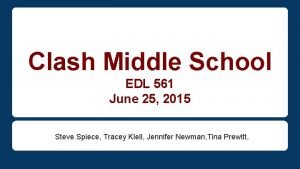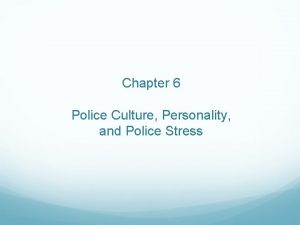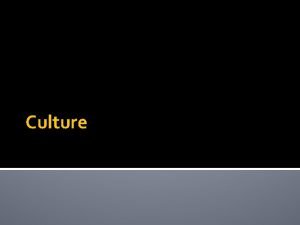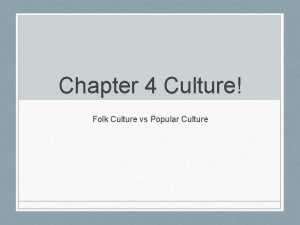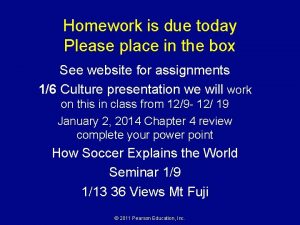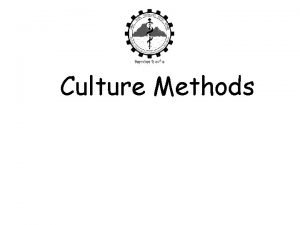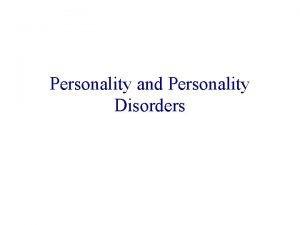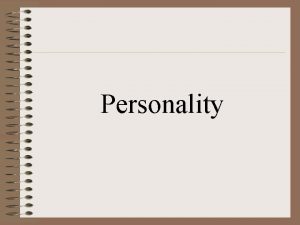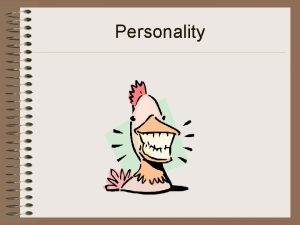School Culture and Climate Culture is the personality











- Slides: 11

School Culture and Climate “Culture is the personality of the organization, Climate represents that organization’s attitude. " http: //www. naesp. org/resources/2/Principal/2008/M-Ap 56. pdf

WHERE WE WERE WHERE WE ARE GOING YEAR 1 YEAR 5 YEAR 7 GRADUATION RATE 2008/09 – 60% 2013/14 – 83% 2016/17 – 95% ATTENDANCE 2008/09 – 75% 2013/14 – 85% 2008/09 – 90%

Behavior Data Total Incidents 2012/2013 216 2013/2014 145 2015/2016 76 ** Our largest decrease was seen in incidents of B-17 Fighting 2012/2013 98 2013/2014 43 2015/2016 37

MCH Expectations: HOPE Healing: Help each other to repair relationships & solve problems. Ownership: Take pride in your words and actions. Own your decisions & their consequences. Purpose: Set goals and know your potential to accomplish them. Engagement: Actively contribute, participate & cooperate.

Promoting a Culture of Success Staff • • • Staff members make themselves available to students who need help Staff meets in formalized collaborative learning groups. Staff collaborates on lesson designs and/or looks at student work, attendance and behavior Staff members visit other programs and schools, attend conferences, seminars, and/or bring in outside practitioners as part of their problem-solving/change process Provide professional development opportunities to staff to ensure that m. CH has a positive and inclusive school environment Student § § § § Students are treated fairly regardless of cultural or racial background or economic status Staff members make themselves available to students who need help Students generally accept responsibility for their schooling, for example they attend class regularly, engage in class work Students are instructed in expected student behavior Various leadership training opportunities are available to any student Students are listened to and have influence in decisions Students participate in Restorative Practices both as participants and student leader Assisted in the program goals and development of PBIS and serve on the Leadership Team with other stakeholders Parents § § The public is involved in, as well as aware and supportive of the school activities Efforts are made to involve parents from all representative racial, cultural, socio-economic etc. Translation services and/or assistive technology, for example translators, large print, written communications in native languages, assistive technology, etc. , are available for parents who need them. School based supports: Dept. Human Services, Henry Ford health Systems Mobile clinic, Thaw (DTE), The Children's Center, Community in Schools, and Community Schools. What we have done to change the culture and climate of MCH

Behavior Matrix

Keeping track of Misbehavior

Consequences Warnings A warning requires that the culture agent pull a student out of class for a brief conversation and delivers a referral slip for students to return with a parent signature. Teachers can choose to take additional measures. Detentions will be held on Wednesdays. Students fill out a “Think Sheet” while in detention. Suspensions will require a readmission conference, accompanied by a parent. A suspension requires that the culture agent pull a student out of class for a brief conversation and delivers a referral slip for students to return on the day of the readmission conference.

Follow-Up Scheduling a restorative session: set a restorative session during advisory (student-tostudent) or outside of class time (student-to-teacher). Issuing a behavior progress plan: require students to check in daily with all of their teachers to help advisors or culture agent keep track of a student’s progress and reassess consequences (see form below). Suggesting the student for enrollment in a partner program: contact partner programs that provide services that students need (see list below).

Behavior Data The theory: If we consistently track minor and major behavior problems (using referrals), we will quickly identify and respond to students who need positive behavior intervention and support. Recording behavior data helps us move from anecdotal to evidence-based discussions about students.

Continuing a Culture of Success Staff § § Promotion of Staff as a Community of Learners and Leaders Share learning experiences in public forums: staff meetings, PD, PLC’s Post Diplomas/Certificates in classrooms and public areas to promote a college going culture Lead by example Students § § § Access to advanced placement, honors; enriched classes etc. Anti-bullying policies and procedures reviewed with students Students safety while in route and on campus Leadership training opportunities for any student Positive behavior supports Celebrating successes; assemblies, rewards, student showcases parents § § Open house activities to encourage parental involvement Offer workshops and seminars on financial planning, and student support Open, positive teacher interactions Encourage and offer Volunteer opportunities What needs to be done to continue positively impacting culture and climate
 Edl positive school culture & climate
Edl positive school culture & climate Climate change 2014 mitigation of climate change
Climate change 2014 mitigation of climate change Police personality and culture
Police personality and culture Examples of non material culture
Examples of non material culture Batch culture vs continuous culture
Batch culture vs continuous culture American vs indian culture
American vs indian culture Stroke culture method
Stroke culture method Folk culture and popular culture venn diagram
Folk culture and popular culture venn diagram Popular culture examples
Popular culture examples Anaerobic medium
Anaerobic medium Folk culture and popular culture venn diagram
Folk culture and popular culture venn diagram Stab culture and stroke culture
Stab culture and stroke culture
